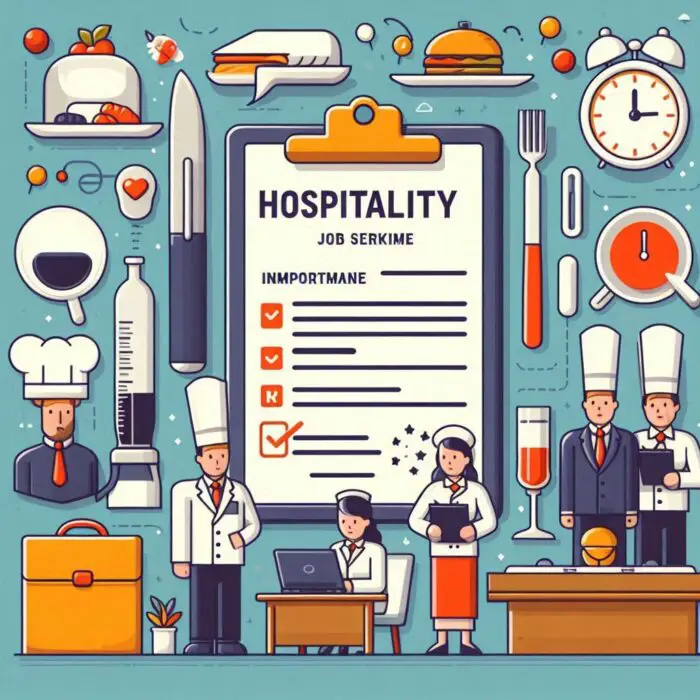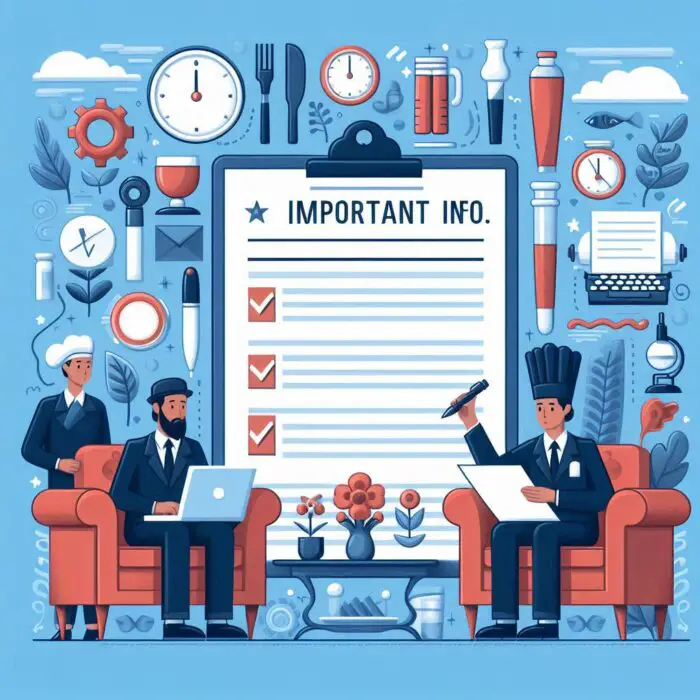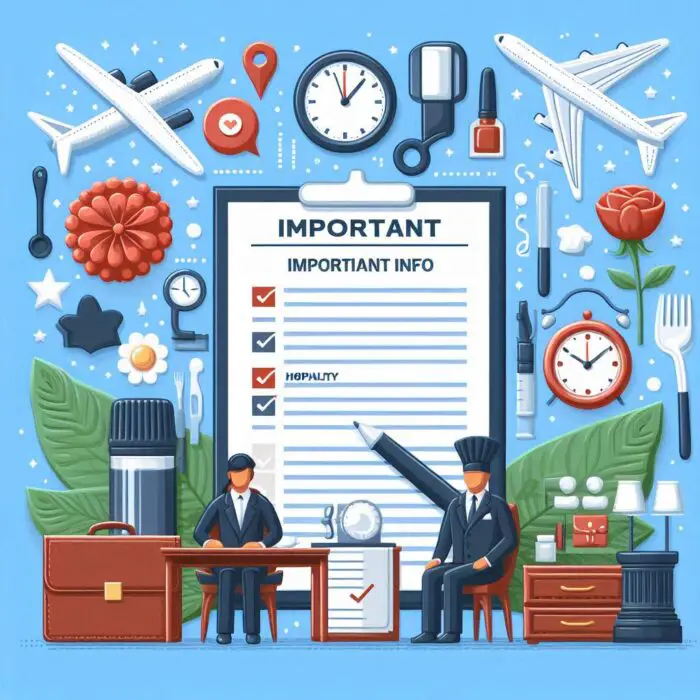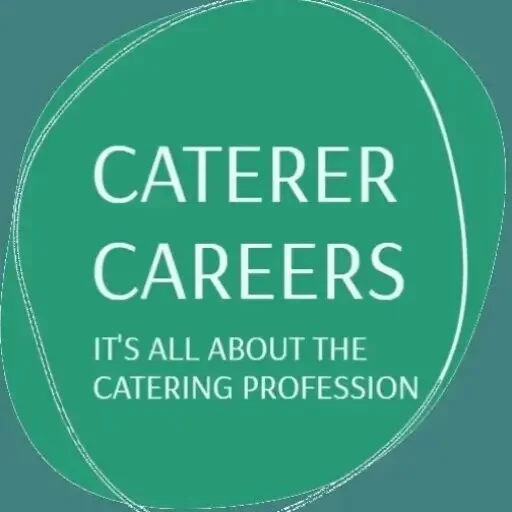
An image characterizing the hospitality profession.
The hospitality industry is dynamic and multifaceted, requiring a unique blend of skills and experiences.
For job seekers looking to make a mark in this competitive field, crafting a compelling resume is crucial.
A well-structured resume not only highlights your qualifications but also sets you apart from other candidates.
This guide will provide key insights into what hospitality job seekers should include in their resumes to increase their chances of landing their desired job.
Key Takeaways
- Tailoring your resume to highlight relevant skills and experiences is essential in the hospitality industry.
- Including specific details about previous roles, certifications, and achievements can make a significant impact.
- Proper formatting and clear, concise language enhance the readability and effectiveness of your resume.
Chart: Essential Elements for a Hospitality Resume
| Section | Key Points to Include |
| Contact Information | Full name, phone number, email address, LinkedIn profile |
| Professional Summary | Brief overview of your experience, skills, and career goals |
| Skills | Relevant skills such as customer service, communication, and management |
| Work Experience | Detailed descriptions of previous roles, responsibilities, and achievements |
| Education | Relevant degrees or certifications in hospitality or related fields |
| Certifications | Industry-specific certifications such as ServSafe, CPR, or first aid |
| Languages | Proficiency in additional languages, if applicable |
| References | List of professional references or statement “Available upon request” |

An image showing the importance of a resume.
Introduction
In the hospitality industry, where customer satisfaction and experience are paramount, your resume needs to reflect your ability to thrive in a fast-paced, service-oriented environment.
Whether you’re applying for a position as a hotel manager, restaurant server, or event coordinator, your resume should showcase your relevant skills, experiences, and achievements.
This guide outlines the essential information that hospitality job seekers should include in their resumes to stand out to potential employers.
Contact Information
Start with your contact information at the top of your resume. Ensure it includes your full name, phone number, and professional email address.
Including a LinkedIn profile is also beneficial as it allows employers to view your professional network and additional details about your career.
Example:
John Doe
(123) 456-7890
john.doe@example.com
linkedin.com/in/johndoe
Professional Summary
A professional summary is a brief section at the beginning of your resume that highlights your key skills and experiences. This summary should be tailored to the specific job you are applying for and should provide a snapshot of your career goals.
Example:
Professional Summary:
Experienced hospitality professional with over 5 years in hotel management and customer service. Skilled in team leadership, operations management, and guest satisfaction.
Seeking a managerial position at a reputable hotel to leverage my expertise in enhancing guest experiences and operational efficiency.
Skills
List your relevant skills in a separate section. Focus on skills pertinent to the hospitality industry, such as customer service, communication, problem-solving, and management abilities.
Be sure to include any technical skills, such as proficiency with reservation systems or point-of-sale (POS) software.
Example:
Skills:
– Excellent customer service and communication skills
– Strong leadership and team management
– Proficient in Opera PMS and Micros POS
– Conflict resolution and problem-solving
– Fluent in Spanish and French

A display of hospitality job seeking.
Work Experience
The work experience section should detail your previous roles, responsibilities, and achievements. Use bullet points to make this information easy to read and focus on accomplishments that demonstrate your skills and contributions to past employers.
Example:
Work Experience:
Restaurant Manager, Sunshine Resort, Miami, FL
June 2018 – Present
– Managed daily operations of a 150-room resort, ensuring high standards of guest service.
– Led a team of 25 staff, providing training and performance evaluations.
– Increased guest satisfaction scores by 15% by implementing new service protocols.
– Oversaw budgeting and financial planning, reducing operational costs by 10%.
Restaurant Server, Ocean Breeze Cafe, Miami, FL
March 2015 – May 2018
– Provided excellent customer service in a fast-paced dining environment.
– Handled cash and credit transactions accurately using Micros POS.
– Trained new servers on menu offerings and service standards.
– Recognized as Employee of the Month for outstanding service.
Education
Include your educational background, particularly if you have degrees or certifications related to hospitality. Mention the institution’s name, the degree or certification obtained, and the dates attended.
Example:
Education:
Bachelor of Science in Hospitality Management
University of Central Florida, Orlando, FL
Graduated May 2014
Certifications
Certifications can enhance your resume by showcasing additional qualifications. Include any industry-specific certifications such as ServSafe, CPR, or first aid.
Example:
Certifications:
– ServSafe Food Protection Manager Certification, 2018
– CPR and First Aid Certification, American Red Cross, 2017
Languages
If you are proficient in multiple languages, list them in a separate section. Being multilingual is a valuable asset in the hospitality industry.
Example:
Languages:
– English (Native)
– Spanish (Fluent)
– French (Conversational)
References
End your resume with a references section. You can either list references or state that they are available upon request.
Example:
References:
Available upon request
Conclusion
Creating a standout resume for the hospitality industry requires attention to detail and a focus on relevant skills and experiences.
By including comprehensive contact information, a tailored professional summary, key skills, detailed work experience, educational background, certifications, and language proficiency, you can create a resume that highlights your qualifications and increases your chances of securing a position in the competitive hospitality field.
Remember to format your resume professionally and use clear, concise language to make a strong impression on potential employers.

